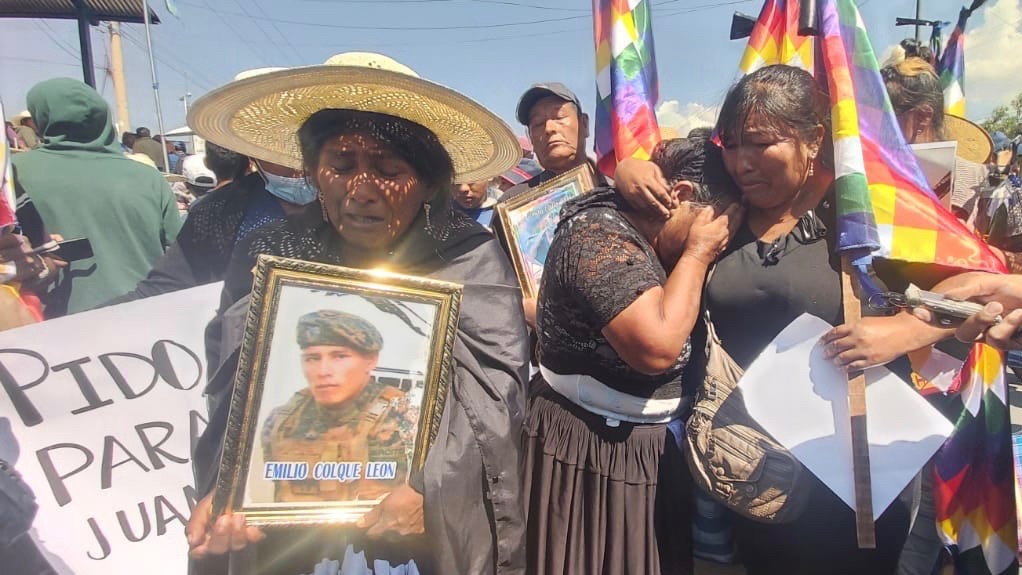The government of president Luis Arce and vice-president David Choquehuanca in Bolivia, on December 15, authorized, through Supreme Decree 4639, the creation of a trust of 8 million bolivianos (1.16 million USD) to make reparation to the victims of human rights violations, including the Sacaba and Senkata massacres, committed during the last trimester of 2019 under the de-facto rule of Jeanine Áñez. The trust will provide loans to the relatives of the deceased and living victims of the 2019 state violence to assist them.
The Justice and Institutional Transparency Minister, Ivan Lima, in a press conference, reported that the beneficiaries who must first be registered by the Justice and Health ministries, will be able to access loans with a 10-year repayment policy and an annual interest rate of 0.5%. He explained that the Productive Development Bank (BDP) will be the entity that allocates the resources.
“This policy is another effort to compensate these citizens for their sufferings,” said Lima. He recalled that president Arce’s administration has already distributed food vouchers, granted 1,500 educational scholarships, and a compensation of 100,000 Bolivianos (14,500 USD) to the deceased victims’ relatives. “The harm is done, and nothing that we do will revert this reality. However, we can compensate the victims and their relatives to achieve justice,” he added.
According to official data, between September 1 and December 31, 2019, at least 38 Bolivians were killed, 800 people were injured, and over 1,000 citizens were unjustly detained.
The coup
Tensions had been brewing in Bolivia before the general elections of October 20, 2019. MAS headquarters in several cities had fallen victim to right-wing attacks. After the victory of former president Evo Morales of the ruling progressive Movement Towards Socialism (MAS) in the elections, the country’s opposition refused to accept the results. They alleged that an electoral fraud had been committed, and began violent mobilizations demanding Morales’ resignation. The far-right paramilitary groups intensified their attacks on pro-MAS citizens. The escalation of violent protests and threats forced Morales to resign and leave the country to save his life.
Following Morales’ resignation and departure, on November 12, 2019, in a session of Congress that met without quorum, right-wing legislator Áñez declared herself interim president, and unleashed an unprecedented level of repression against those who took to the streets in rejection of the coup.
On November 15, 2019, in Sacaba city in the Cochabamba department, Bolivian security forces brutally repressed a peaceful anti-coup march with tear gas and live bullets, killing at least 11 and gravely injuring more than a hundred protesters. The same day, Áñez approved Decree 4078, which exempted police and military officials participating in repression operations from criminal responsibility.
Four days later, on November 19, 2019, protected by this impunity decree, heavily armed police officers and soldiers tear-gassed and shot firearms against the Indigenous residents of El Alto, who had blockaded the entry to the Senkata gas plant as a measure of protest, killing another dozen protesters and injuring another hundred.
The coup-supporting security forces carried out selective and violent house raids, and arrested numerous sympathizers of the MAS party. Young female detainees were sexually abused by police officers. Male Indigenous detainees were also brutally tortured and humiliated.
On August 17, the Interdisciplinary Group of Independent Experts of Bolivia (GIEI-Bolivia) of the Inter-American Commission on Human Rights (IACHR) in its report that the coup-installed regime led by Áñez was responsible for massacres, torture, persecution, illegal detention, and summary executions of those rejected the coup. The report also confirmed that the violence was characterized by ethnic and racial discrimination.
President Arce’s government has been continuously working for the past one year to guarantee justice and reparation to the victims. It is working on laws to enable broader reparation, dismantle para-police organizations and irregular groups, and other aspects based on the GIEI’s recommendations. So far, the Bolivian Justice has detained 13 former military commanders, two former police officials and three civilians, including Áñez, in relation to the human rights violations.





